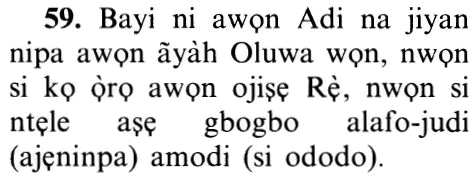11vs59
Select any filter and click on Go! to see results
وَتِلْكَ عَادٌ جَحَدُواْ بِآيَاتِ رَبِّهِمْ وَعَصَوْاْ رُسُلَهُ وَاتَّبَعُواْ أَمْرَ كُلِّ جَبَّارٍ عَنِيدٍ
Watilka AAadun jahadoo biayati rabbihim waAAasaw rusulahu waittabaAAoo amra kulli jabbarin AAaneedin
Index Terms
Click to play
Yoruba Translation

Hausa Translation
Haka Ãdãwa suka kasance, sun yi musun ãyõyin Ubangijinsu, kuma sun sãɓa wa ManzanninSa, kuma sun bi umurnin dukan mai girman kai, makangari.
Asbabu n-Nuzuul (Occasions of Revelation)
وَتِلْكَ عَادٌ جَحَدُواْ بِآيَاتِ رَبِّهِمْ وَعَصَوْاْ رُسُلَهُ ...
Such were `Ad (people). They rejected the Ayat of their Lord, and disobeyed His Messengers,
This means they disbelieved in the proofs and revelations (of Allah) and they disobeyed the Messengers of Allah.
This is due to the fact that whoever disbelieves in a Prophet, then verily, he has disbelieved in all of the Prophets, peace be upon them. There is no difference between any one of them, in the sense that it is necessary to believe in all of them. Therefore, `Ad disbelieved in Hud and their disbelief was considered disbelief in all of the Messengers.
... وَاتَّبَعُواْ أَمْرَ كُلِّ جَبَّارٍ عَنِيدٍ ﴿٥٩﴾
and followed the command of every proud, obstinate.
This means that they abandoned following their rightly guided Messenger and they followed the command of every proud, obstinate person. Thus, they were followed in this life by a curse from Allah and His believing servants whenever they are mentioned. On the Day of Resurrection a call will be made against them in front of witnesses.
" وتلك عاد جحدوا بآيات ربهم " كفروا بها وعصوا رسل الله وذلك أن من كفر بنبي فقد كفر بجميع الأنبياء ; لأنه لا فرق بين أحد منهم في وجوب الإيمان به ; فعاد كفروا بهود فنزل كفرهم منزلة من كفر بجميع الرسل" واتبعوا أمر كل جبار عنيد " تركوا اتباع رسولهم الرشيد واتبعوا أمر كل جبار عنيد .
"وتلك عاد" إشارة إلى آثارهم أي فسيحوا في الأرض وانظروا إليها ثم وصف أحوالهم فقال "جحدوا بآيات ربهم وعصوا رسله" جمع لأن من عصى رسولا عصى جميع الرسل لاشتراكهم في أصل ما جاءوا به وهو التوحيد "واتبعوا" أي السفلة "أمر كل جبار عنيد" معاند للحق من رؤسائهم
ابتداء وخبر . وحكى الكسائي أن من العرب من لا يصرف " عادا " فيجعله اسما للقبيلة .
I'raab - grammatical analysis of the Qur'an
«وَتِلْكَ عادٌ» الواو استئنافية وتلك اسم اشارة مبتدأ واللام للبعد والكاف للخطاب وعاد خبر والجملة مستأنفة.
«جَحَدُوا» ماض وفاعله والجملة صفة لعاد أو حال.
«بِآياتِ» متعلقان بجحدوا.
«رَبِّهِمْ» مضاف إليه والهاء مضاف إليه.
«وَعَصَوْا رُسُلَهُ» الواو عاطفة وماض وفاعله ومفعوله والهاء مضاف إليه والجملة معطوفة.
«وَاتَّبَعُوا» ماض وفاعله والجملة معطوفة.
«أَمْرَ» مفعول به.
«كُلِّ» مضاف إليه.
«جَبَّارٍ» مضاف إليه.
«عَنِيدٍ» صفة.
